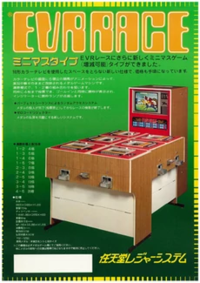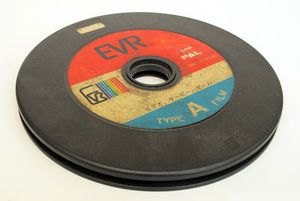From NintendoWiki, your source on Nintendo information. By fans, for fans.
| EVR Race
|

Flyer
|
|
| Developer(s):
|
Nintendo
|
| Publisher(s):
|
Nintendo
|
| Platform:
|
Arcade
|
| Category:
|
{{{category}}}
|
| Players:
|
{{{players}}}
|
| Predecessor:
|
{{{predecessor}}}
|
| Successor:
|
{{{successor}}}
|
|
| N. America:
|
{{{releasena}}}
|
| Japan:
|
1975
|
| Europe:
|
{{{releaseeu}}}
|
| Australia:
|
{{{releaseau}}}
|
| S. Korea:
|
{{{releasekr}}}
|
|
[[{{{niwa}}}|{{{niwa}}}]] has more information on this game:
{{|EVR Race|Read it now!}}
|
|
EVR Race is an arcade game by Nintendo. It is Nintendo's first standard arcade game, following on from the Laser Clay Shooting System.
Summary
EVR Race is a basic mechanical horse racing betting game. It was designed by Genyo Takeda.
This game uses EVR (Electronic Video Recording)

The EVR tape used in the cabinet. It's labeled "Video Derby Game"
technology. Unlike other Nintendo arcade games (Donkey Kong, Mario Bros., et cetera), it is not a video arcade game. There were 4 different types: EVR Race-2, 3, 4, and 5. Each type supported up to the number it was, so 2=2 players, 3=3 players,and so on. There were different models for each though. For example, EVR Race-3 had 2 different variations: one that supported a minimum of 1 and 2. 4 had 1, 2, and 3, and 5 had 1, 2, 3, and 4. It was Nintendo's first time incorporating video technology.

|
This article is a stub. You can help NintendoWiki by expanding it.
|
References

